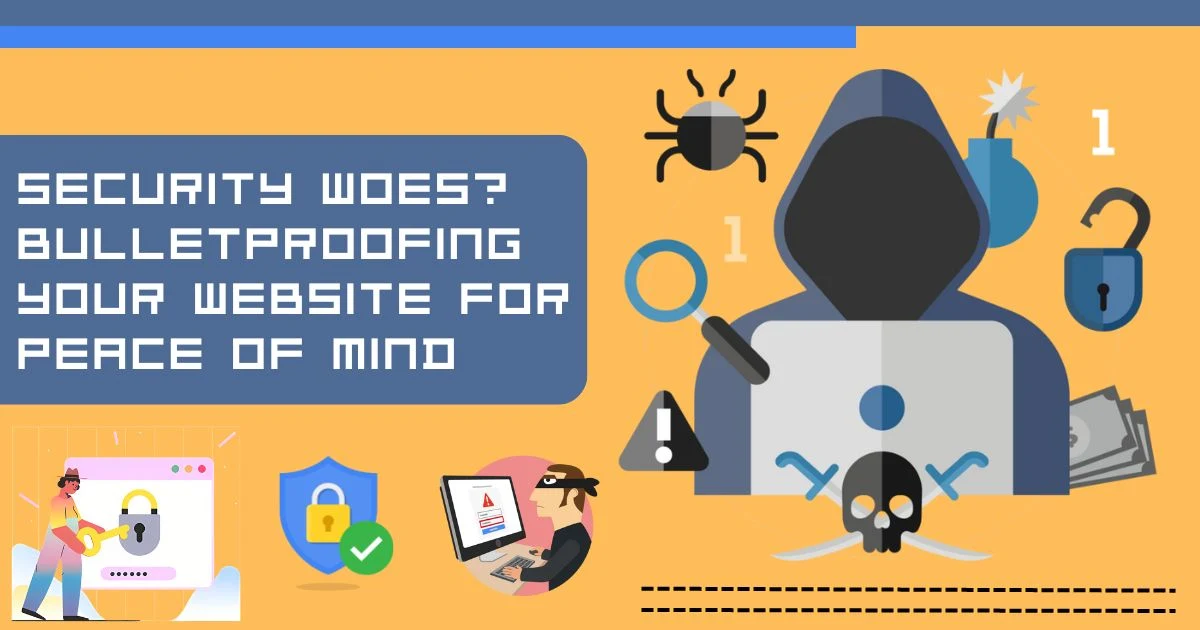Security Woes? Bulletproofing Your Website for Peace of Mind
In today's digital age, website security is paramount. Cyber threats are becoming increasingly sophisticated, and the consequences of a breach can be devastating. From financial losses to reputational damage, the stakes are high. Ensuring your website is secure is not just a necessity but a critical part of your overall business strategy. Incorporating Website Development Services can help you build a robust security framework. In this comprehensive guide, we will explore the essential steps to bulletproof your website and provide peace of mind.

Understanding the Importance of Website Security
Website
security is the practice of protecting websites from unauthorized access,
misuse, or damage. With the rise of cyberattacks, it's more important than ever
to implement robust security measures. A secure website not only
protects sensitive data but also builds trust with your visitors and improves
your site's SEO rankings.
Common Cyber Threats
Understanding
the types of threats your website might face is the first step in creating a
robust defense strategy. Here are some common cyber threats:
- Malware: Malicious software that can damage or disable
systems, steal data, or spy on users.
- Phishing: Fraudulent attempts to obtain sensitive information
by disguising as a trustworthy entity.
- DDoS Attacks: Distributed Denial of Service attacks overwhelm a
website with traffic, causing it to crash.
- SQL Injection: Attackers insert malicious SQL queries into input
fields to manipulate or steal data from the database.
- Cross-Site Scripting (XSS): Attackers inject malicious scripts into web pages
viewed by other users.
Essential Security Measures
1. Use Strong Passwords and Two-Factor Authentication
Passwords are the first line of defense against unauthorized access.
Ensure all passwords are strong, unique, and changed regularly. Implementing Two-Factor
Authentication (2FA) adds an extra layer of security, requiring users to
verify their identity through a secondary method.
2. Regularly Update Software and Plugins
Outdated
software and plugins are prime targets for attackers. Regularly updating
your website's software, themes, and plugins ensures that you have the latest
security patches and features. Enable automatic updates whenever possible to
reduce the risk of vulnerabilities.
3. Install an SSL Certificate
An
SSL certificate encrypts data transmitted between your website and its
users, protecting sensitive information from interception. SSL certificates
also improve your SEO rankings, as search engines favor secure websites.
4. Implement Web Application Firewalls (WAFs)
A
Web Application Firewall (WAF) monitors and filters incoming traffic to
your website, blocking malicious requests and protecting against various
attacks. WAFs can be cloud-based or hardware-based and are essential for
maintaining a secure environment.
5. Conduct Regular Security Audits
Regular
security audits help identify vulnerabilities and ensure compliance with
security standards. Use automated tools and manual testing to conduct thorough
audits, and address any issues promptly.
6. Backup Your Website Regularly
Regular
backups are crucial for recovering your website in case of a breach or
data loss. Store backups in multiple locations, including offsite or cloud
storage, and test them periodically to ensure they can be restored quickly.
7. Monitor Your Website for Suspicious Activity
Implement
real-time monitoring to detect and respond to suspicious activity
promptly. Use security plugins or services that provide alerts and detailed
reports on potential threats.
8. Educate Your Team
Human
error is a common cause of security breaches. Educate your team on best
practices for cybersecurity, including recognizing phishing attempts, using
secure passwords, and following company policies.
Advanced Security Strategies
1. Implement Content Security Policy (CSP)
A
Content Security Policy (CSP) helps prevent XSS attacks by specifying
which sources of content are trusted. By defining rules for loading content,
you can mitigate the risk of malicious scripts being executed on your site.
2. Use Secure Coding Practices
Follow
secure coding practices to minimize vulnerabilities in your website's
code. This includes validating input, using prepared statements for SQL
queries, and sanitizing user data.
3. Enable HTTP Security Headers
HTTP
security headers provide an additional layer of security by controlling how
browsers handle your website's content. Key headers include Strict-Transport-Security
(HSTS), Content-Security-Policy (CSP), and X-Frame-Options.
4. Employ DDoS Protection Services
DDoS
attacks can cripple your website, making it unavailable to users. DDoS
protection services can absorb and mitigate attack traffic, ensuring your
site remains accessible.
Read More About The Beginner’s Guide to Website Development Service
Incorporating Website Development Services
While
implementing security measures is crucial, it's equally important to ensure
that these measures are seamlessly integrated into the overall structure of
your website. Website Development Services play a vital role in this
aspect. Professional developers can build a site from the ground up with
security in mind, incorporating best practices from the start.
1. Security by Design
When
you employ Website Development Services, security is woven into the
fabric of your website from the beginning. This approach includes secure coding
practices, proper configuration of servers, and the implementation of necessary
security protocols.
2. Ongoing Maintenance and Support
Security
threats are constantly evolving, and maintaining a secure website requires
continuous effort. Professional Web Development Services Provider ongoing maintenance and support, ensuring that your website remains secure
against new threats and vulnerabilities.
Conclusion
Website
security is an ongoing process that requires vigilance and proactive measures. iGex Solutions implementing the strategies outlined in this guide and leveraging
professional Website Development Services, you can bulletproof your
website and provide peace of mind for yourself and your users. Remember, a
secure website is not just a technical necessity but a cornerstone of your
business's success.

.jpg)

Comments
Post a Comment